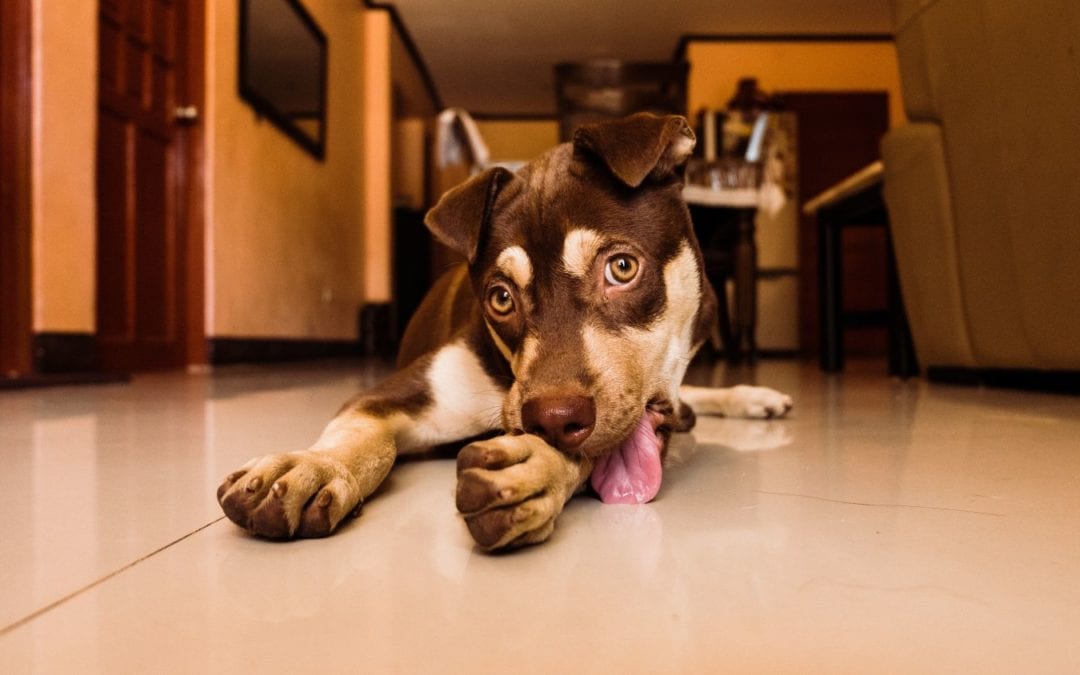Dogs lick for a variety of reasons but excessive licking can not only be annoying but an indication of a problem. Here are a few reasons your pet might be licking:
Injury
If your dog is licking or chewing at one spot in particular, such as their paw, it’s a good idea to check the area for an injury or debris. They can get thorns or burrs between the pads of their feet and dogs with thick coats may have a laceration or puncture wound under all that fur.
Nausea
Just like people, dogs get upset tummies and just like people, it can cause excessive salivation and/or a gross taste in their mouth. Dogs who suffer chronic stomach upset can benefit from something as simple as a dietary change. Hill’s Prescription i/d food is specifically formulated for dogs with sensitive GI systems.
Hunger or Dehydration
Remember Pavlov’s dogs? Dogs who are hungry or think they are about to eat salivate more which can lead to increased licking.
Itchy Skin
If your dog’s licking is accompanied by chewing, scratching or head-shaking, your pet may be suffering from allergies. Other symptoms can include nasal or eye discharge, rash and itchy or painful ears. Dogs can be allergic to a variety of things so you’ll want to work with your veterinary team to determine the right treatment. Dogs with severe allergies may need to undergo allergy testing.
Dental Disease
If your dog is licking and has stinky breath or changes in their eating habits, it might be time for dental cleaning. Oral lesions and foreign objects may also cause your dog to lick excessively.
Neurologic Problems
Canine distemper is not a disease we see often thanks to vaccinations but infected dogs can have what are commonly referred to as “chewing gum fits”. What looks like excessive licking may in fact be a seizure. It’s important to keep your dog up-to-date on his or her vaccinations.
Cognitive Dysfunction
Older dogs can develop something like dementia. As their brain function becomes impaired you may notice things such as tremors or excessive licking.
Obsessive Compulsive Disorders
Dogs can experience psychological disorders which can lead to compulsive behaviors such as excessive licking. Stress, anxiety, separation and boredom can all lead to excessive licking.
Since dogs can’t tell us why they’re licking, we as caregivers have to do some investigating. Figuring out the cause and the appropriate treatment can prevent a transient behavior from becoming a habitual behavior. Your veterinarian can help but since your dog spends the most time with you, he or she will be relying on your keen observations. Some details to note are:
- When did it start?
- When does it happen?
- How long does it go on?
- Can you easily distract/stop the behavior?
- Once the behavior is stopped, does your dog go right back to it?
- Does the dog do it when no one else is around?
You’ll also want to note any changes in your dog’s environment such as the addition of a housemate, some moving away or construction going on. Sometimes, things as small as re-arranging furniture can be stressful for our pets so make note of any changes in your pet’s routine or environment.
Once you and your veterinarian have determined a suspected cause, you can then move on to treatment. Your vet may recommend flea treatment, allergy medication or maybe a dietary change helps you and your pet find relief. If no clinical diagnosis can be made and the licking is behavioral, your veterinarian can make some recommendations on behavior modification or the introduction of medications that reduce anxiety. He or she may even recommend consulting a dog trainer to work with you and your pet to help curb habitual excessive licking.

